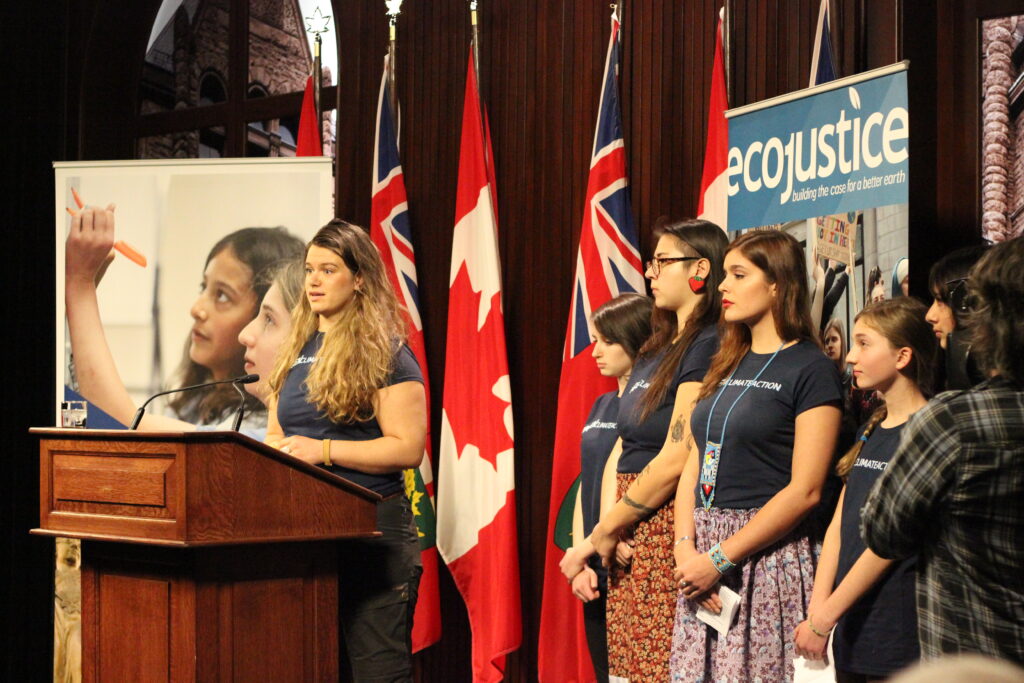The Path to Net Zero Must be Grounded in Strong, Properly Enforced Laws
The science is clear and courts agree: we need to significantly reduce emissions in the next decade to prevent catastrophic climate change. In 2019, seven youth represented by Ecojustice Canada and Stockwoods LLP took the Province of Ontario and the Conservative government to court for weakening its emission reduction target, arguing that the move undermined their, and other young Ontarians’, Charter rights to life, security of the person, and equality in the face of climate change. Recently, the top court of Ontario sided with them.
Six years ago, in 2018, the Ontario government passed climate change legislation and set a provincial greenhouse gas emissions reduction target. That target was, and is, astonishingly weak – 30% below 2005 levels by 2030[1]. Last week, Ontario’s top court granted the appeal by seven youth applicants in Mathur et al v Ontario – the Charter based climate litigation focused on that weak target. The applicants are headed back to the lower court with a strong legal finding in tow (that this case is not a “positive rights” claim and so that weak target is subject to the Charter).

This decision comes at an interesting time for the climate change emergency in Canada. The climate is at best a side issue in the current political landscape, and at worst, it is being cynically used as wedge issue that exploits the cost-of-living crisis to turn voters against climate policies. Within this frustrating context we are seeing a familiar pattern play out. Climate policies are at the mercy of the political and economic cycles, too easily discarded when they become politically inconvenient.
The energy transition requires sustained and coordinated action now and over the next several decades – a time horizon ill suited to the ever shortening political, media and business cycles. Climate action needs to endure through changes in government. While the exact blend of policies can change – the overall direction of travel must not. Emissions must rapidly decline year on year.
“The energy transition requires sustained and coordinated action now and over the next several decades”
It is for these reasons that the UK adopted its landmark climate change act in 2008. This legislation requires a long-term emissions reduction target bolstered by a strict obligation on government to adopt five-year carbon budgets, under the watchful eye of a fiercely independent – and often vocally critical – expert body, in the Climate Change Committee.
While in recent years the UK has not delivered emissions cuts at the exact pace and scale demanded by the targets or climate science, it has succeeded in a more foundational way. The cross-party consensus on climate change has held – just – through one of the most tumultuous periods in British political history. The institutional infrastructure remains in place. The new Labour government will be held to account by legislation that it passed when it was last in power. The Conservatives bid to make climate change a wedge issue failed.

We are about to find out whether Canada’s own climate framework law – adopted in 2021 and closely modelled on the UK’s – will prove as durable. Will it ensure that a possible Conservative majority government, despite its vocal opposition to key pillars of the Federal Liberal climate agenda (carbon pricing, clean electricity regulations, an oil and gas emissions cap) nevertheless comes forward with the credible plan required by law but conspicuously absent from their election platform?
Will provincial climate laws withstand the current “greenlash” sweeping the country? Even BC, historically a pioneer and leader on climate, with its own climate accountability act, has seen a leader who was kicked out of his former party for his climate denialism come within a whisker of leading the Conservatives to victory.
Good climate accountability laws put in place strong checks and balances and procedural safeguards to deter backsliding on climate. Under current federal Canadian Net-Zero Emissions Accountability Act – a new government could rip up its predecessor’s climate plan, but would eventually be required to come up with a detailed plan of their own, and report to parliament, and two independent bodies, on how it will achieve targets set for 2030 and 2035.
“Good climate accountability laws put in place strong checks and balances and procedural safeguards to deter backsliding on climate.”
But ultimately, a government with a healthy majority may feel immune to those pressures. They may try to ignore their legal obligations entirely, or come forward with the kind of climate “action” that bears more relation to a campaign brochure than a serious climate plan. Or, shockingly in this era of floods and fires, they could go further and repeal the climate laws that cause them such inconvenience.
Doug Ford’s government took a middle road upon taking power in Ontario. Out went the Climate Change Mitigation and Low-carbon Economy Act, in came new legislation with a weaker target.

Last week’s decision from the Ontario Court of Appeal highlighted the vital role that the courts play. It resonates when a court says: Climate science is irrefutable. Climate targets matter. Government backtracking on climate risks the lives and safety of millions of people, potentially violating their Charter protected rights to life and security of the person, and to equal protection under the law.
The Court of Appeal has sent the youth applicants back to the lower court (and the Court of Appeal’s decision may be appealed to the Supreme Court of Canada). We will have to wait for a decision on the merits of the Charter claim. But in the meantime, this decision is important.
Canada is a massive polluter, with some of the highest per capita emissions in the world and a long and dismal track record of setting and then missing climate targets. But there are signs that we could be approaching a tipping point. Latest figures show that Canada’s emissions are finally heading in the right direction – although nowhere near fast enough.
As University of Ottawa law professor Stewart Elgie said to the CBC last week, “The [Ontario Court of Appeal] is not telling governments how to tackle climate change.” Instead, the takeaway is that once a government commits to addressing climate change, even under a previous administration, its targets and plans must actually protect people and avoid dangerous emissions.
Climate change is an existential threat, a threat far too important to be left to the short-termism that drives politics. The duty to act on climate is, increasingly, anchored in the law, and governments must face scrutiny by parliament, experts and voters. Increasingly, they will also be held to account in the courts.
[1] The IPCC has said that the world must, on average, reduce emissions by 45% below 2010 levels by 2030. This means 52% below 2005 levels – Ontario, a wealthy province in a wealthy country, has set a target that is almost half as strong as it needs to be.














